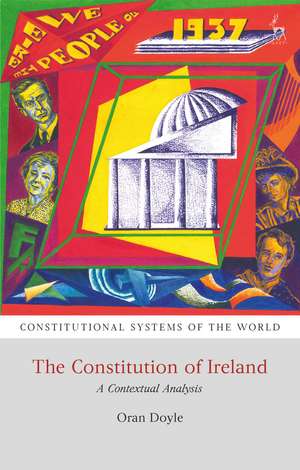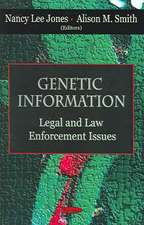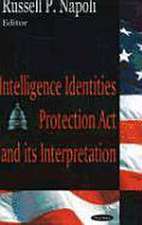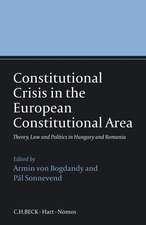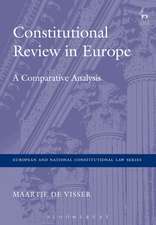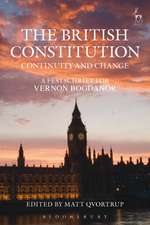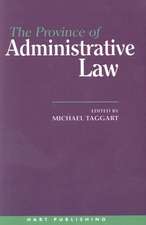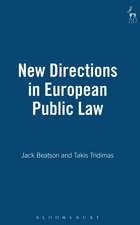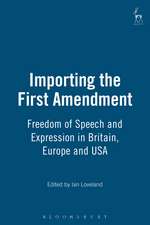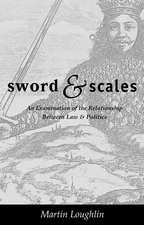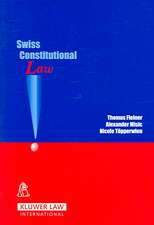The Constitution of Ireland: A Contextual Analysis: Constitutional Systems of the World
Autor Dr Oran Doyleen Limba Engleză Paperback – 28 noi 2018
Din seria Constitutional Systems of the World
- 13%
 Preț: 174.07 lei
Preț: 174.07 lei - 38%
 Preț: 134.64 lei
Preț: 134.64 lei - 23%
 Preț: 197.68 lei
Preț: 197.68 lei - 14%
 Preț: 147.59 lei
Preț: 147.59 lei - 34%
 Preț: 509.52 lei
Preț: 509.52 lei - 28%
 Preț: 374.41 lei
Preț: 374.41 lei - 40%
 Preț: 466.81 lei
Preț: 466.81 lei - 22%
 Preț: 263.72 lei
Preț: 263.72 lei - 23%
 Preț: 185.93 lei
Preț: 185.93 lei - 19%
 Preț: 166.82 lei
Preț: 166.82 lei - 23%
 Preț: 152.82 lei
Preț: 152.82 lei - 21%
 Preț: 218.26 lei
Preț: 218.26 lei - 23%
 Preț: 178.47 lei
Preț: 178.47 lei - 19%
 Preț: 303.62 lei
Preț: 303.62 lei - 18%
 Preț: 300.14 lei
Preț: 300.14 lei - 30%
 Preț: 510.03 lei
Preț: 510.03 lei - 14%
 Preț: 192.30 lei
Preț: 192.30 lei - 18%
 Preț: 304.66 lei
Preț: 304.66 lei - 23%
 Preț: 178.02 lei
Preț: 178.02 lei - 18%
 Preț: 225.31 lei
Preț: 225.31 lei - 23%
 Preț: 197.14 lei
Preț: 197.14 lei - 18%
 Preț: 180.44 lei
Preț: 180.44 lei - 18%
 Preț: 179.98 lei
Preț: 179.98 lei - 18%
 Preț: 186.35 lei
Preț: 186.35 lei - 14%
 Preț: 179.00 lei
Preț: 179.00 lei - 16%
 Preț: 218.47 lei
Preț: 218.47 lei - 19%
 Preț: 184.14 lei
Preț: 184.14 lei - 18%
 Preț: 297.58 lei
Preț: 297.58 lei - 16%
 Preț: 218.00 lei
Preț: 218.00 lei - 18%
 Preț: 232.54 lei
Preț: 232.54 lei - 18%
 Preț: 225.49 lei
Preț: 225.49 lei - 14%
 Preț: 185.93 lei
Preț: 185.93 lei - 13%
 Preț: 230.79 lei
Preț: 230.79 lei - 13%
 Preț: 186.10 lei
Preț: 186.10 lei - 19%
 Preț: 179.10 lei
Preț: 179.10 lei -
 Preț: 223.20 lei
Preț: 223.20 lei - 18%
 Preț: 180.44 lei
Preț: 180.44 lei -
 Preț: 217.09 lei
Preț: 217.09 lei - 18%
 Preț: 186.35 lei
Preț: 186.35 lei
Preț: 171.85 lei
Preț vechi: 223.71 lei
-23% Nou
Puncte Express: 258
Preț estimativ în valută:
32.88€ • 34.42$ • 27.21£
32.88€ • 34.42$ • 27.21£
Carte tipărită la comandă
Livrare economică 05-19 aprilie
Preluare comenzi: 021 569.72.76
Specificații
ISBN-13: 9781509903436
ISBN-10: 1509903437
Pagini: 256
Dimensiuni: 138 x 216 x 18 mm
Greutate: 0.32 kg
Editura: Bloomsbury Publishing
Colecția Hart Publishing
Seria Constitutional Systems of the World
Locul publicării:London, United Kingdom
ISBN-10: 1509903437
Pagini: 256
Dimensiuni: 138 x 216 x 18 mm
Greutate: 0.32 kg
Editura: Bloomsbury Publishing
Colecția Hart Publishing
Seria Constitutional Systems of the World
Locul publicării:London, United Kingdom
Caracteristici
A unique interpretation that goes beyond traditional constitutional anlysis of the division of the executive, legislator and courts, to analyse the practical operation of the constitution.
Notă biografică
Oran Doyle is Associate Professor of Law at Trinity College Dublin.
Cuprins
1. Beginnings, Influences and Evolution 2. Constitutional Foundations 3. Government and Oireachtas 4. The President 5. Legislative Power and Interpretation 6. Governance and Public Administration 7. Political Constraints on the Government 8. Courts and the Legal Constraint of the Government 9. Fundamental Rights and Judicial Power 10. Constitutional Change 11. Conclusion
Recenzii
The Constitutional Systems of the World series aims to provide interested readers with accessible volumes that outline the historical, political and legal context that gives life to the bare texts of national constitutions. The Irish contribution to this series succeeds in fulfilling all of these objectives.
The Constitution of Ireland: A Contextual Analysis offers a timely interdisciplinary analysis which will be of interest to lawyers, social scientists and other scholars with an interest in Irish public life, as well as interested general readers. It would be ideal for undergraduate and introductory law school courses on Irish and comparative constitutional law; and ideally it will contribute to establishing a tradition of contextual research on Irish constitutional law.
Oran Doyle's contribution to Hart's Constitutional Systems of the World series should be read by anyone with an interest in Irish constitutional law and also by comparative constitutional lawyers.
The Constitution of Ireland: A Contextual Analysis offers a timely interdisciplinary analysis which will be of interest to lawyers, social scientists and other scholars with an interest in Irish public life, as well as interested general readers. It would be ideal for undergraduate and introductory law school courses on Irish and comparative constitutional law; and ideally it will contribute to establishing a tradition of contextual research on Irish constitutional law.
Oran Doyle's contribution to Hart's Constitutional Systems of the World series should be read by anyone with an interest in Irish constitutional law and also by comparative constitutional lawyers.
